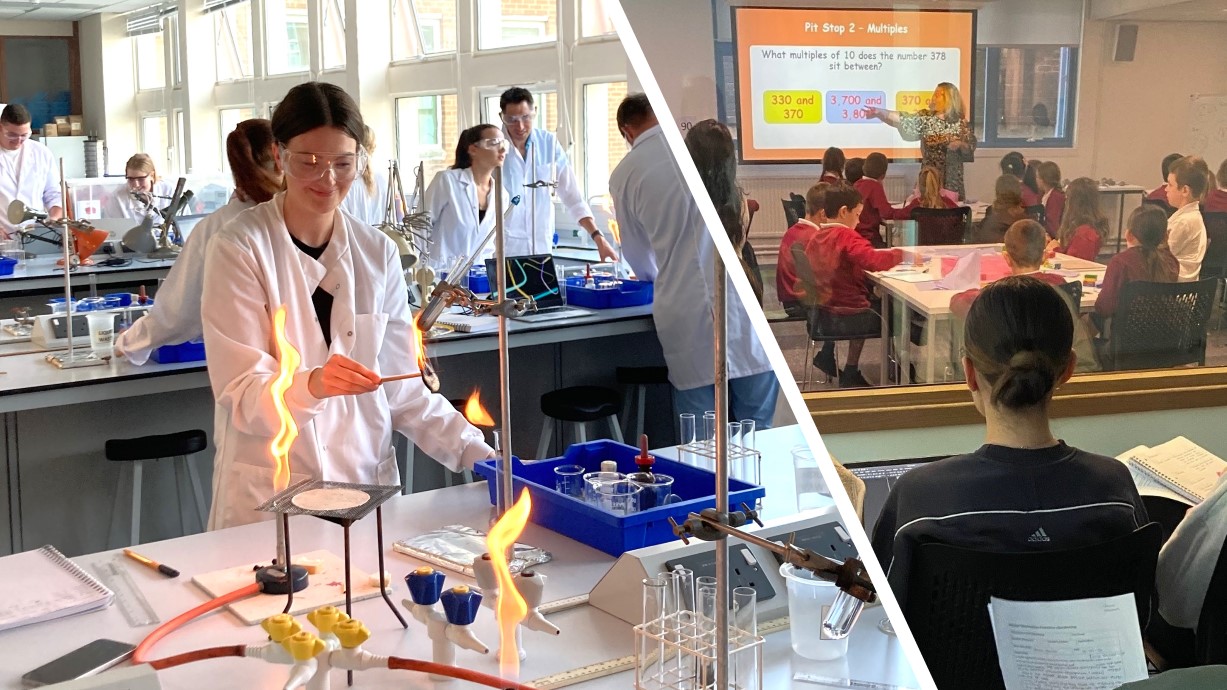
One of the ways the SUSP supports its student teachers is through the use of observational classrooms. These spaces give students a safe, authentic and engaging opportunity to reflect on and discuss teaching and learning.
Estyn, His Majesty’s Inspectorate for Education and Training in Wales, has written an overwhelmingly positive report on the Swansea University Schools’ Partnership (SUSP), commending the rich and stimulating learning experiences delivered through its Postgraduate Certificate in Education (PGCE) programmes.
Dr Russell Grigg, Director of Initial Teacher Education (ITE) at Swansea University, said: “The success of our PGCE programmes rests on the quality of teaching and support in both university and school, which helps our students develop as effective, caring, and thoughtful teachers.
“It is very uplifting to read that ‘nearly all student teachers demonstrate highly positive attitudes to learning.’ This is quite remarkable, given the well-known intensity of PGCE programmes.”
In the report, published on Wednesday 11 September, inspectors observed that “nearly all students feel listened to [and] well supported”.
Hannah Rees, a PGCE Secondary graduate, said: “The culture of the programme is positive, questioning, and vibrant around teaching. I felt part of something. You can’t understate that.”
With a high demand for well-qualified Welsh teachers across the UK, the report also praised the University for offering “valuable learning experiences for students to practise their Welsh in informal settings such as the Clwb Cinio for primary students, and a SUSP Eisteddfod.”
Tami O’Neill, a PGCE Primary student who won the Crown at the inaugural SUSP Eisteddfod, said: “Celebrating all of the Welsh culture with my peers was a really bonding experience.”
Inspectors noted there is a strong collaborative partnership between the University and a network of fifty schools in south and west Wales, observing that although the programmes are relatively new, they are built on “trust and mutual respect.”
The report said: “There is a clear vision, shared and enacted by all partners, to develop student teachers who are research-informed and reflective practitioners.”
This emphasis on research, led by the Department of Education and Childhood Studies’ Centre for Research into Practice (CRIP), is something that is highlighted throughout the report and is in keeping with the Welsh Government’s educational priorities.
Estyn said: “Student teachers are provided with numerous valuable opportunities to engage and develop their research skills [and] reflect deeply on how their own practice benefits from their engagement with theory…through their academic modules, the Practice and Theory (PaT) days and multiple opportunities to work purposefully with their peers.”
Professor Andy Townsend, Head of the Department of Education and Childhood Studies, said: “Our student teachers, colleagues from the wider department, school partners and children themselves are all part of what Estyn recognised as a strong research community.
“One of the standout strengths that the inspectors reported on is the applied nature of our research. This means that our student teachers and partner schools can see its value in the classroom, whether that is exploring the role of artificial intelligence, engaging parents, or increasing children’s fitness levels. Curiosity is part of our collective DNA.”
Professor Paul Boyle, Vice-Chancellor of Swansea University, said: “We are thrilled that Estyn has acknowledged the exceptional quality of teaching and collaborative practices embedded in our SUSP programmes.
“This fantastic report is a reflection of the dedication, enthusiasm and expertise of our programme leaders and partners. It also serves as a testament to the commitment and passion of our student teachers, who represent the future changemakers in education.”
Estyn has invited the SUSP to write two case studies as examples of good practice, one on its support for student well-being and another on the valuable integration of research and enquiry throughout its programmes.
The SUSP currently offers two programmes: PGCE Secondary, which was accredited by the Education Workforce Council (EWC) in 2020, and PGCE Primary, which, following accreditation, began in 2022.
Read the Estyn report in full.
Find out more about the Swansea University Schools’ Partnership.
